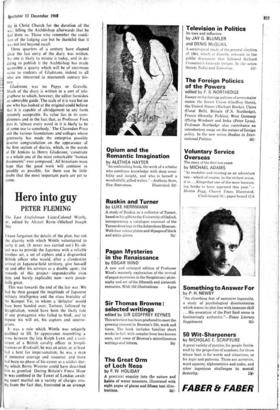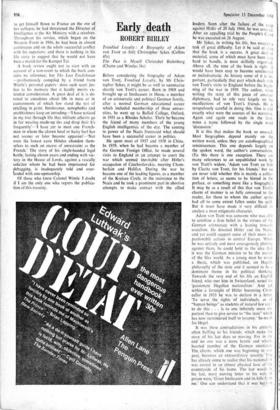Hero into guy
PETER FLEMING
The Last Englishman Lieut-Colonel Wintle, Mc, edited by Alistair Revie (Michael Joseph 50s) I have forgotten the details of the plan, but not the alacrity with which Wintle volunteered to carry it out. (It never was carried out.) Its ob- ject was to provide the Japanese with a- reliable wireless set, a set of ciphers and a disgruntled British officer who would, after a clandestine arrival in Japanese-held territory, give himself up and offer his services as a double agent: the rewards of this project—imponderable even - then and barely explicable now—were poten- tially great.
This was towards the end of the last war. We had by then gauged the ineptitude of Japanese military intelligence and the crass brutality of the Kempei Tai, to whom a 'defector' would have been handed over. Torture, followed by decapitation, would have been the likely fate of any protagonist who failed to bluff, and to impose his will on, his captors and interro- gators.
It was a role which Wintle was uniquely qualified to fill. In appearance resembling a cross between the late Ralph Lynn and a cari- cature of a British cavalry officer in Simpli- eissimus or Krokodil, he was an actor, or at least had a bent for impersonation; he was a man of immense courage and resource; and there had .been no phase of his career as a soldier dur- ing which Bertie Wooster could have described him as gruntled. During Britain's Finest Hour he was confined in the Tower of London await- ing court martial on a variety of charges aris- ing-from the fact that, frustrated in an attempt to get himself flown to France on the eve of her collapse, he had threatened the Director of Intelligence at the Air Ministry with a re-volVer. Throughout his service, which began on the Western Front in 1916, he had been in almost continuous and on the whole successful conflict with his superiors; and there is nothing in his life story to suggest that he would not have been a match for the Kempei Tai.
A book review ought not to start with an account of a non-event to which the book con- tains no reference; but The Last Englishman —posthumously compiled by a friend from Wintle's personal papers—does such scant jus- tice to his memory that it hardly merits ex- tended consideration. A great deal of it is de- voted to anecdotes about life in mess or in cantonments of which few stand the test of retelling in print. Intolerance, xenophobia and snobbishness keep on intruding-1 have noticed in my trot through life that militant atheists go in for wearing made-up ties and drop their h's frequently'—`I have yet to meet one French- man in whom the cloven hoof or hairy heel has• not sooner or later become apparent'—`Not even the lowest caste Hindus abandon them- selves to such an excess of unrestraint as the French.' The story of his single-handed legal battle, lasting eleven years and ending with vic- tory in the House of Lords, against a rascally solicitor whom he had been imprisoned for debagging, is inadequately told and over- larded with one-upmanship.
Of those who knew Colonel Wintle. I doubt if I am the only one who regrets the publica- tion of this travesty.















































 Previous page
Previous page